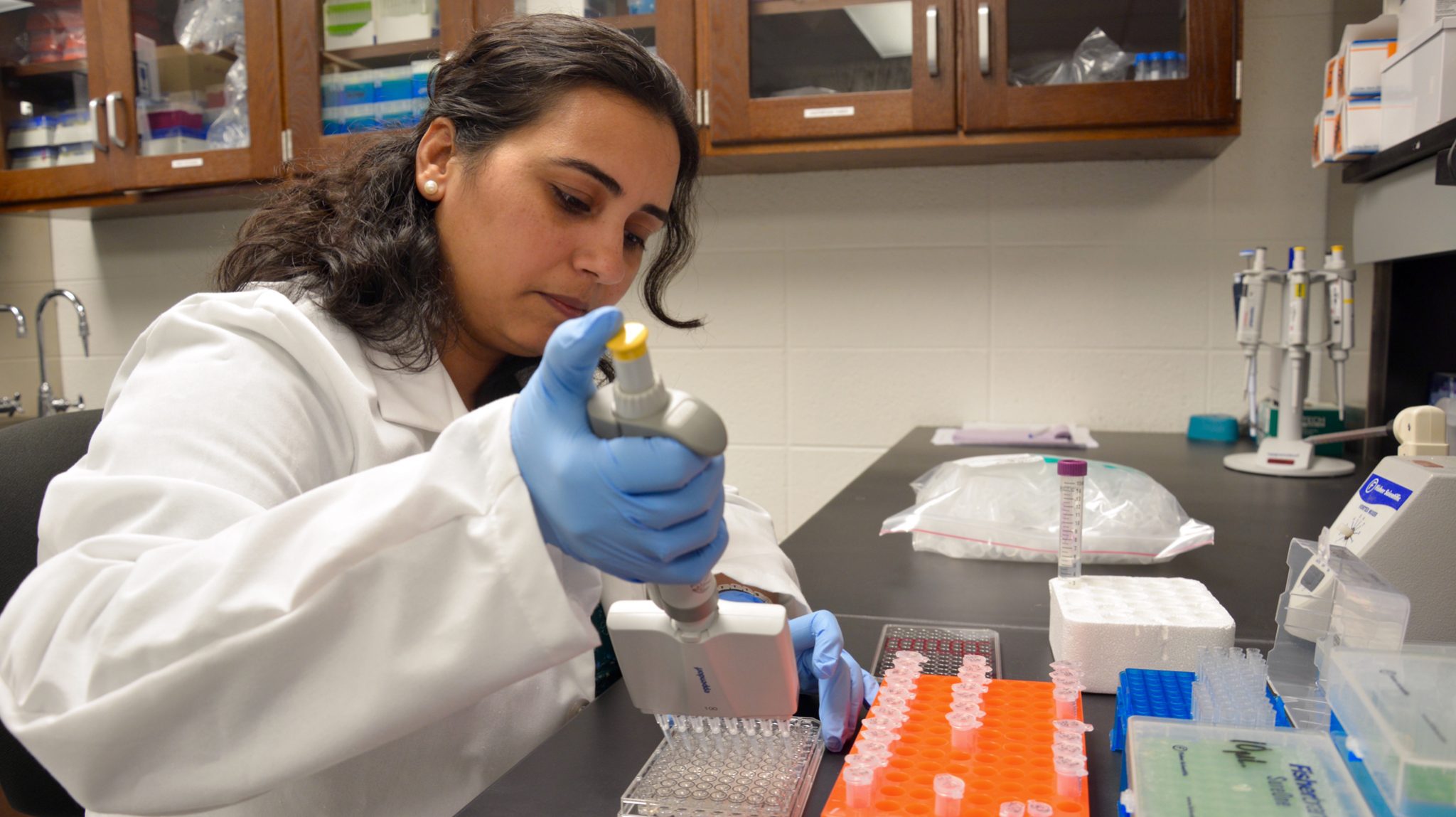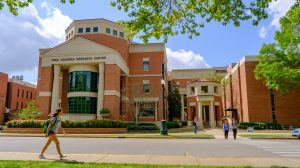
Associate research and development biologist Nisha Mishra works in one of the UM School of Pharmacy’s Centers of Biomedical Research Excellence labs. Photo by Sydney Slotkin DuPriest/School of Pharmacy
OXFORD, Miss. – The University of Mississippi School of Pharmacy rose to sixth in the nation in external research funding for 2018, according to the American Association of Colleges of Pharmacy.
Research funding reached $21.2 million in 2018, placing the School of Pharmacy second in the SEC and among the top 5 percent of pharmacy schools nationwide.
“The School of Pharmacy is a health research leader, impacting not only our region and the nation, but international health as well, which is reflected in this banner year for research funding,” said David D. Allen, UM pharmacy dean. “This accomplishment is the sum of the incredible efforts of faculty, research scientists, staff and students from across our school.”
The $21.2 million includes funding for projects that span botanical research with international impacts to inquiries into how to better provide necessary pharmacy services for underserved Mississippians. The school’s state-of-the-art laboratories, nationally recognized researchers and international research collaborations contribute significantly to the university’s R1 designation in the Carnegie classification system as a doctoral university of very high research activity.
The School of Pharmacy is in the midst of several studies on the impact of opioids, including a study led by pharmacy administration professor Yi Yang, which looks at long-term opioid use in older adults.
Although older adults are not often at the center of opioid issues, this National Institutes of Health-funded study addresses the effects of long-term opioid use among older people and aims to provide insights into the safe and effective management of chronic pain for aging Americans by selecting the right opioids with the appropriate dose and formulation.
The school’s National Center for Natural Products Research receives funding from the Food and Drug Administration to use the center’s expertise in botanicals to verify ingredients in dietary supplements and ensure the products’ safety and quality. This work over many years has resulted in NCNPR being named an FDA Center of Excellence.
NCNPR also receives funding from and collaborates with the U.S. Department of Agriculture to discover and develop natural products for pharmaceutical and agrichemical uses. For more than 50 years, the National Institute on Drug Abuse has awarded NCNPR’s Marijuana Project a competitive contract to grow and produce marijuana materials for research, as well as conduct analysis on cannabis and related materials.
“The natural products center is honored to continue this vital work of studying and optimizing our botanical resources for the benefit of global health,” said Ikhlas Khan, director of NCNPR. “This work is dependent on funding from our partners, and we are very grateful for their support.”

The University of Mississippi School of Pharmacy rose to sixth in the nation in external research funding for 2018, according to the American Association of Colleges of Pharmacy. Photo by Robert Jordan/Ole Miss Digital Imaging Services
In the Department of Pharmaceutics and Drug Delivery, associate professor Mahavir Chougule receives funding from NIH to explore ways to treat asthma using gene therapy and nanotechnology. Also within the department, chair Michael Repka and professor S. Narasimha Murthy are conducting a study using funding from FDA to improve the quality of topically applied medications.
Other funded studies at the school focus on preventing diseases. Katie Barber, an assistant professor of pharmacy practice, partners with investigators at the University of Texas at Dallas on an NIH-funded study that aims to better manage patients with infective endocarditis, a bacterial infection that attacks the heart.
One of the most common causes of infective endocarditis is bacteria called viridans group streptococci, which can quickly develop resistance to treatment.
“If we can determine why some patients are at a higher risk of contracting VGS, we are hoping that we can lower the mortality rate associated with infective endocarditis,” Barber said.
In the pharmacy school’s biomolecular sciences laboratories, pharmacologist Joshua Sharp is using ultra-high-speed chemistry and cutting-edge technologies, such as mass spectrometry and NMR spectroscopy, to better understand the three-dimensional structure of proteins, thanks to a grant from NIH.
“These technologies will allow us to actually see what the structure of the proteins looks like and see how the proteins interact with each other,” Sharp said. “We will then make models of the proteins that can be used to make future experiments with proteins easier.”
With health care changing rapidly on a global and regional scale, Ole Miss pharmacy researchers are working to find funding for projects that will do the most good as efficiently as possible.
“The research funding secured by investigators at the School of Pharmacy has the potential for exponential returns by way of reduced health care costs and healthier outcomes for patients impacted by our research,” Allen said.
“In addition, employing the large number of people needed to conduct this research brings economic benefits to the surrounding area and our state. I could not be prouder of the research at the University of Mississippi School of Pharmacy.”